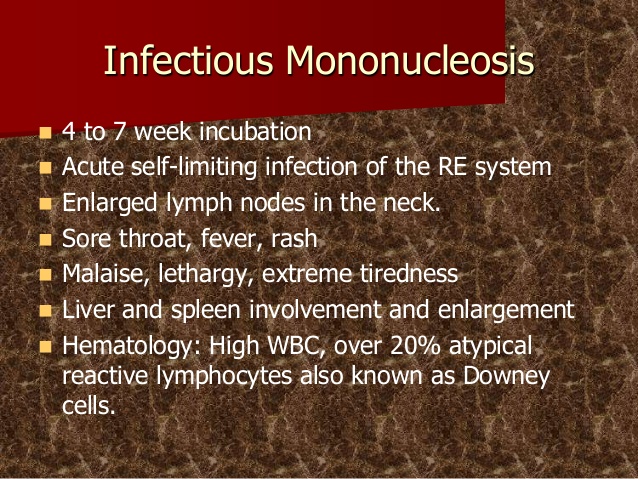
We’ve all heard of the “kissing disease,” also known as mono.
Mononucleosis is caused by the Epstein-Barr virus, which actually infects almost everyone by the time they are 40 years old. Usually, though, it does not make you sick.
When it does, it comes in the form of mono. Once you get mono, you have the virus inside of you for life. But that doesn’t mean you are contagious for life. It does, however, pop back up from time to time, and you might never know when you are infecting someone.
It’s called the kissing disease because the virus lives in your salivary glands. It spreads through saliva – i.e. kissing or eating and drinking after someone.
What are the symptoms of mono?
Once you’ve been diagnosed with mono, you should prepare yourself for four-six weeks of illness. You can stay sick for two months.
The following are symptoms of mono:
- a fever
- a sore throat
- swollen lymph glands in the neck and armpits
- a headache
- fatigue
- muscle weakness
- swollen tonsils
- night sweats
The problem with mono is that its symptoms can often be confused for other illnesses, like cold or flu. If you have these symptoms and they don’t go away after a week or two, it’s time to go to your doctor and see if you have the kissing disease.
The good news is that the virus does not spread as quickly or as easily as you might believe, and once you have already had it the chances of you ever getting it again are quite low.
How do you avoid the kissing disease?
There are a few easy things you can do to avoid catching mono – and avoid spreading it if you already have the kissing disease, including:
- Avoid kissing or sharing dishes or eating utensils with a mono patient. It’s worth noting, though, that a light peck on the lips will likely not result in a case. You have to get saliva in your mouth to get infected.
- Don’t donate blood if you have mono. Although it is typically spread through saliva, in some cases it can be spread through blood.
- Wash your hands often.
- Stay away from someone who has mono.
- Never share a toothbrush with someone.
- Use disposable towels and cups in the bathroom.
- Don’t let your children share toys if one has mono.
- Sterilize pacifiers and bottles for your babies.
- Keep everything disinfected, especially countertops and other surfaces.
- Eat healthy foods that are high in antioxidants – leafy vegetables, tomatoes, blueberries and cherries.
- Exercise regularly.
If you think you or someone you know might have the kissing disease, stop by Urgent Care and let one of our talented, passionate doctors take a look.
